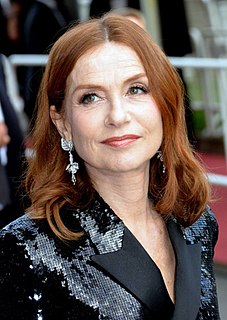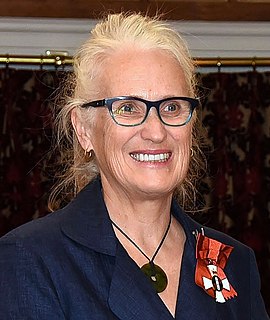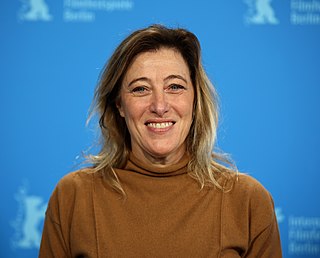Related Research Articles

Isabelle Anne Madeleine Huppert is a French actress. Described as "one of the best actresses in the world", she is known for her portrayals of cold and disdainful characters devoid of morality. The recipient of several accolades, including two César Awards, five Lumières Awards, a BAFTA Award, three Cannes Film Festival honors, a Golden Globe Award, an Independent Spirit Award, and an Academy Award nomination; in 2020, The New York Times ranked her second on its list of the greatest actors of the 21st century.

Marcello Vincenzo Domenico Mastroianni was an Italian film actor, regarded as one of Italy's most iconic male performers of the 20th century, and one of Europe's most prominent actors and screen sex symbols from the 1960s and 1970s. A pet actor of five-time Academy Award-winning director Federico Fellini, he starred in such films as La Dolce Vita; 8½; La Notte; Divorce Italian Style; Yesterday, Today and Tomorrow; Marriage Italian Style; The 10th Victim; A Special Day; City of Women; Henry IV, and Everybody's Fine.

Claire Denis is a French film director and writer. Her feature film Beau Travail (1999) has been called one of the greatest films of the 1990s. Other acclaimed works include Trouble Every Day (2001), 35 Shots of Rum (2008), White Material (2009), High Life (2018) and Both Sides of the Blade (2022), the latter of which won her the Silver Bear for Best Director at the Berlin International Film Festival. For her film Stars at Noon (2022), Denis competed for the Palme d'Or at the 2022 Cannes Film Festival. She won the Grand Prix, sharing the award with Lukas Dhont's film Close.

Dame Elizabeth Jane Campion is a New Zealand director, screenwriter, and producer. She has received two Academy Awards, two BAFTA Awards, and two Golden Globe Awards for her critically acclaimed films, The Piano (1993), and The Power of the Dog (2021). Campion was appointed a Dame Companion of the New Zealand Order of Merit (DNZM) in the 2016 New Year Honours, for services to film.

Valeria Bruni Tedeschi, also written Bruni-Tedeschi, is an Italian-French actress, screenwriter and film director. Her 2013 film, A Castle in Italy, was nominated for the Palme d'Or at the 2013 Cannes Film Festival.

Cinema of Africa is both the history and present of the making or screening of films on the African continent, and also refers to the persons involved in this form of audiovisual culture. It dates back to the early 20th century, when film reels were the primary cinematic technology in use. During the colonial era, African life was shown only by the work of white, colonial, Western filmmakers, who depicted Africans in a negative fashion, as exotic "others". As there are more than 50 countries with audiovisual traditions, there is no one single 'African cinema'. Both historically and culturally, there are major regional differences between North African and sub-Saharan cinemas, and between the cinemas of different countries.

The Senegal national basketball team represents Senegal in men's international basketball and it is overseen by Federation Senegalaise de basketball, five time a gold medallist, a six time silver medallist, and a four time bronze medallist at the FIBA Africa Championship. Senegal was the first Sub-Saharan African team to qualify for the Summer Olympics Basketball Tournament.
Safi Faye is a Senegalese film director and ethnologist. She was the first Sub-Saharan African woman to direct a commercially distributed feature film, Kaddu Beykat, which was released in 1975. She has directed several documentary and fiction films focusing on rural life in Senegal.
Kaddu Beykat is a 1975 Senegalese film directed by Safi Faye. It was the first feature film made by a Sub-Saharan African woman to be commercially distributed and brought international recognition for its director. Centred on a romance, it chronicles the daily lives of people in a rural Senegalese village.

The cinema of Senegal is a relatively small film industry which experienced its prime from the 1960s through to the early 1980s, but has since declined to less than five feature films produced in the last ten years.

The 32nd Cannes Film Festival was held from 10 to 24 May 1979. The Palme d'Or went to Apocalypse Now by Francis Ford Coppola, which was screened as a work in progress, and Die Blechtrommel by Volker Schlöndorff.

Senegalese literature is written or literary work which has been produced by writers born in the West African state. Senegalese literary works are mostly written in French, the language of the colonial administration. However, there are many instances of works being written in Arabic and the native languages of Wolof, Pulaar, Mandinka, Diola, Soninke and Serer. Oral traditions, in the form of Griot storytellers, constitute a historical element of the Senegalese canon and have persisted as cultural custodians throughout the nation’s history. A form of proto-Senegalese literature arose during the mid 19th century with the works of David Abbé Boilat, who produced written ethnographic literature which supported French Colonial rule. This genre of Senegalese literature continued to expand during the 1920s with the works of Bakary Diallo and Ahmadou Mapaté Diagne. Earlier literary examples exist in the form of Qur’anic texts which led to the growth of a form African linguistic expressionism using the Arabic alphabet, known as Ajami. Poets of this genre include Ahmad Ayan Sih and Dhu al-nun.

The Wicked Lady is a 1983 British-American drama film directed by Michael Winner and starring Faye Dunaway, Alan Bates, John Gielgud, Denholm Elliott, and Hugh Millais. It was screened out of competition at the 1983 Cannes Film Festival. It is a remake of the 1945 film of the same name, which was one of the popular series of Gainsborough melodramas.

Hyenas is a 1992 Senegalese film adaptation of Friedrich Dürrenmatt's Swiss-German satirical tragicomedy play The Visit (1956), directed by Djibril Diop Mambéty. The intimate story of love and revenge parallels a critique of neocolonialism and African consumerism. It was entered into the 1992 Cannes Film Festival.
Rachida is a 2002 Algerian drama film directed by Yamina Bachir. It was screened in the Un Certain Regard section at the 2002 Cannes Film Festival. The film was also the first 35mm full length feature directed by an Algerian woman that was released wide-spread.
The Serer religion, or a ƭat Roog, is the original religious beliefs, practices, and teachings of the Serer people of Senegal in West Africa. The Serer religion believes in a universal supreme deity called Roog. In the Cangin languages, Roog is referred to as Koox, Kopé Tiatie Cac, and Kokh Kox.

Yandé Codou Sène was a Senegalese singer from the Serer ethnic group. She was born in 1932 at Somb in the Sine-Saloum delta and died on July 15, 2010 at Gandiaye in Sénégal. She was the official griot of president Léopold Sédar Senghor. Most of her music is in the Serer language.

The patronym Faye is one of the typical surnames of the Serer people of Senegal, the Gambia and Mauritania. In French-speaking Senegal and Mauritania, and English-speaking Gambia, the surname is spelled Faye.
Women are involved in the African film industry in a variety of roles, though they have been underrepresented in creative positions.
References
- ↑ "Festival de Cannes: Mossane". festival-cannes.com. Retrieved 20 September 2009.
- ↑ Ellerson, Beti, "Safi Faye's Gaze: The Evolution of an African Woman's Cinema", Reference Guide to African Women in Cinema, retrieved 19 December 2009
- ↑ Brennan, Sandra. "Mossane > Overview". Allmovie . Retrieved 19 December 2009.
- ↑ Thackway, Melissa (2003). Africa shoots back: alternative perspectives in Sub-Saharan Francophone African Film. James Currey. p. 155. ISBN 0-85255-576-8.